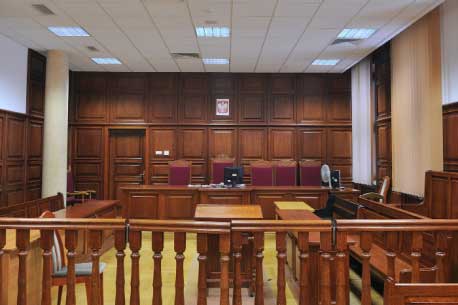After conclusion of the preparatory proceedings, depending on their results, the case can be brought to court. This is the beginning of the judicial stage of the criminal procedure: from then on the court is the "host" of the proceedings, instead of the prosecutor or the police.
FIRST-INSTANCE HEARING
After receiving the indictment, the court designates the date of the first-instance hearing during which the evidence is presented. Generally, the trial is held in the open court (exceptions to this rule are specified in Chapter 42 of the Code of Criminal Procedure) and is conducted orally. At the beginning, the indictment is read out and the supporting evidence is provided: witnesses are heard, experts' opinions are presented. The defendant and the defence counsel are always entitled to express the closing argument.
Selected legal provisions:
Article 365. The hearing is conducted orally.
Article 367. § 1. The presiding judge permits the parties to express themselves on any matter which is to be resolved.
§ 2. If one of the parties expresses oneself in any issue, other parties are also entitled to express their views. The defence counsel and the defendant are entitled to the closing argument.
Article 379. § 1. When the panel of judges enters the room or leaves it, all people present stand up.
§ 2. Any person addressed by the court or addressing the court also stands up, unless he or she is exempted from this obligation by the presiding judge.
Article 381. § 1. The first-instance hearing is commenced with the calling of the case. Then the presiding judge verifies whether all people summoned have appeared and whether there are no impediments to hearing the case.
Article 384. § 1. After checking whether the summoned people have appeared, the presiding judge orders the witnesses to leave the courtroom. Experts remain in the courtroom, unless ordered otherwise by the presiding judge.
§ 2. If the aggrieved person has appeared, he or she can take part in the hearing and can remain in the courtroom even if he or she is supposed to testify as a witness. In such a case, the court hears this person first.
JUDGEMENT AND APPEAL
At the end of this stage of the proceedings, the court evaluates the evidence presented, taking into account the rules of correct reasoning, knowledge and experience, and then delivers the judgement.
Article 410. Judgement can be based solely on the circumstances disclosed during the first-instance hearing.
Certainly, an unfavourable judgement can and ought to be appealed to a higher instance court (a regional court or a court of appeal - depending on whether the first-instance court was respectively a district court or a regional court).
Appeal ought to be lodged within 14 days from the date of service of the first-instance court's judgement with the statement of reasons. However, court of appeal conducts the proceedings in the limited scope - it examines whether in a given case there are grounds specified in the Code to rescind or change the judgement of the first-instance court.
Article 444. § 1. Parties are entitled to appeal against the judgement rendered by the first-instance court, and the aggrieved person is entitled to appeal against the judgement conditionally discontinuing the proceedings, delivered at a sitting, unless the statutes provide otherwise.
Article 445. § 1. The time limit for lodging an appeal is 14 days. For each person entitled to appeal this time limit runs from the date of service of the judgement with the statement of reasons.
[Legal status as at July 2015]



